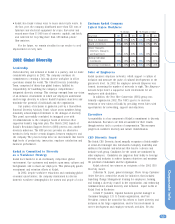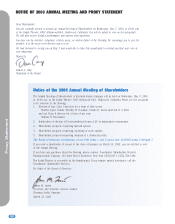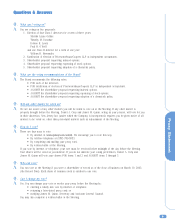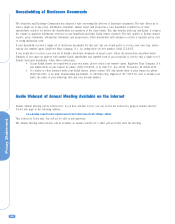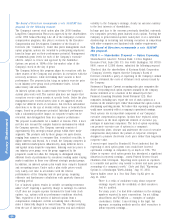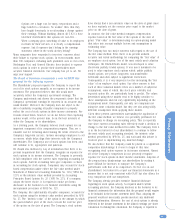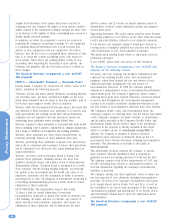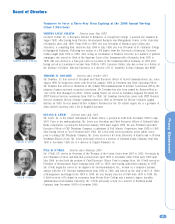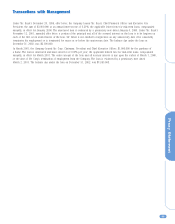Kodak 2002 Annual Report Download - page 91
Download and view the complete annual report
Please find page 91 of the 2002 Kodak annual report below. You can navigate through the pages in the report by either clicking on the pages listed below, or by using the keyword search tool below to find specific information within the annual report.
Proxy Statement
86
The Board of Directors recommends a vote AGAINST this
proposal for the following reasons:
The Company’s current stock option plan (the 2000 Omnibus
Long-Term Compensation Plan) was approved by the shareholders
at the 1999 Annual Meeting. Like all of the Company’s executive
compensation programs, this plan is overseen by the Executive
Compensation and Development Committee of the Board of
Directors (the “Committee”). Under this plan’s management stock
option program, options are awarded to participating employees
based in large part on their performance potential. Management
recommends grant levels for each of the Company’s executive
officers, subject to review and approval by the Committee.
Options are priced at 100% of the fair market value of the
Company’s stock on the day of grant.
The Company believes this program aligns its executives with the
other owners of the Company and provides its executives with the
necessary incentives, while still linking their awards to their
performance. The proposed plan, tying an option’s exercise price
to an industry peer group stock performance index, is both
unnecessary and unworkable.
An indexed options plan is unnecessary because the Company’s
current plan works well. The current plan does not require that
executives receive option awards at specific levels. Under the plan
management uses external survey data to set suggested award
ranges for different levels of executives, but reserves substantial
discretion as to the size of awards within, above or beneath these
ranges, based on performance potential. Individual performance
with a substantial positive impact on corporate results can be
rewarded, and distinguished from less superior performance.
The proposal is unworkable for a number of reasons. First, it does
not take into account the complex business environment in which
the Company operates. The Company currently consists of
approximately fifty strategic product groups within three major
segments. The products sold by these groups are quite diverse,
ranging from scanners, to consumer film, to medical x-ray film, to
digital cameras and beyond. As a result, the Company competes in
many different marketplaces influenced by many different forces,
and against many disparate companies. Indexing exercise prices to
any industry peer group, even the group suggested by the
proponent, would not allow the Company to distinguish among
different levels of performance by executives working under varying
market conditions in these very different strategic product groups.
In addition, an indexed options plan would raise complex financial
and accounting issues. Under such a plan strike prices would
vary widely over time in accordance with the relative
performances of the Company and its peer group, requiring
elaborate and burdensome calculations each quarterly financial
reporting period.
Use of indexed options results in variable accounting treatment
under GAAP, requiring a quarterly charge to earnings. In contrast,
GAAP does not require expense treatment for fixed term stock
options, e.g., options with no performance conditions attached.
Thus, regardless of the merits of indexed options from a
compensation standpoint, current accounting rules effectively
make it financially illogical to award them. The charges resulting
from the use of indexed options could depress and add artificial
volatility to the Company’s earnings, clearly an outcome contrary
to the best interests of shareholders.
In large part due to the concerns previously identified, extremely
few companies presently grant indexed stock options. Forcing the
Company to grant indexed options could place it at a substantial
disadvantage in recruiting and retaining executives in competition
with other companies not burdened with similar requirements.
The Board of Directors recommends a vote AGAINST
this proposal.
ITEM 4 — Shareholder Proposal — Option Expensing
Massachusetts Laborers’ Pension Fund, 14 New England
Executive Park, Suite 200, P.O. Box 4000, Burlington, MA 01803-
0900, owner of 12,800 shares, submitted the following proposal:
“Resolved, that the shareholders of Eastman Kodak Corporation
(“Company”) hereby request that the Company’s Board of
Directors establish a policy of expensing in the Company’s annual
income statement the costs of all future stock options issued by
the Company.
Statement of Support: Current accounting rules give companies the
choice of reporting stock option expenses annually in the company
income statement or as a footnote in the annual report (See:
Financial Accounting Standards Board Statement 123). Most
companies, including ours, report the cost of stock options as a
footnote in the annual report, rather than include the option costs in
determining operating income. We believe that expensing stock options
would more accurately reflect a company’s operational earnings.
Stock options are an important component of our Company’s
executive compensation program. Options have replaced salary
and bonuses as the most significant element of executive pay
packages at numerous companies. The lack of option expensing
can promote excessive use of options in a company’s
compensation plans, obscure and understate the cost of executive
compensation and promote the pursuit of corporate strategies
designed to promote short-term stock price rather than long-term
corporate value.
A recent report issued by Standard & Poor’s indicated that the
expensing of stock option grant costs would have lowered
operational earnings at companies by as much as 10%. “The
failure to expense stock option grants has introduced a significant
distortion in reported earnings,” stated Federal Reserve Board
Chairman Alan Greenspan. “Reporting stock options as expenses
is a sensible and positive step toward a clearer and more precise
accounting of a company’s worth.” Globe and Mail, “Expensing
Options Is a Bandwagon Worth Joining,” Aug. 16, 2002.
Warren Buffett wrote in a New York Times Op-Ed piece on
July 24, 2002:
There is a crisis of confidence today about corporate
earnings reports and the credibility of chief executives.
And it’s justified.
For many years, I’ve had little confidence in the earnings
numbers reported by most corporations. I’m not talking
about Enron and WorldCom — examples of outright
crookedness. Rather, I am referring to the legal, but
improper, accounting methods used by chief executives to
inflate reported earnings…


